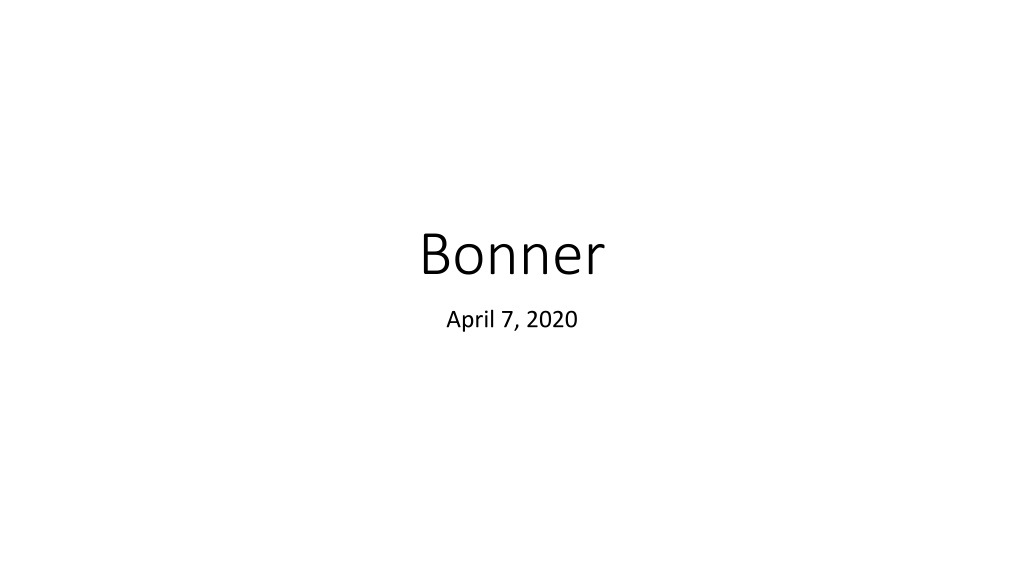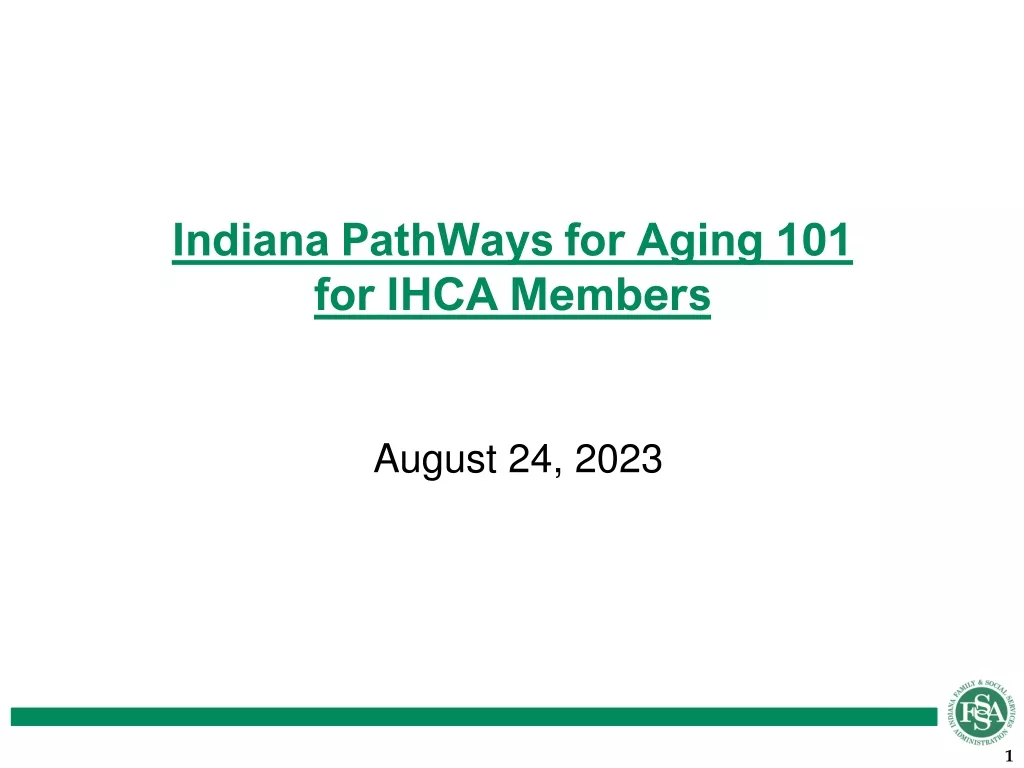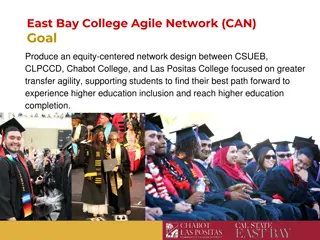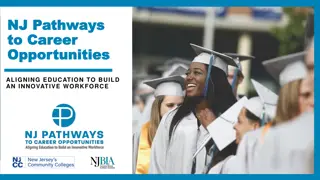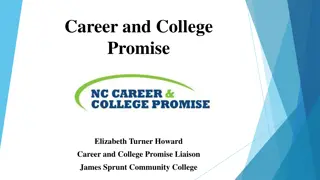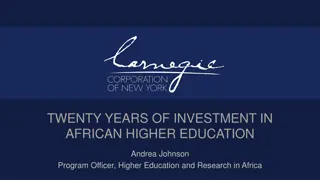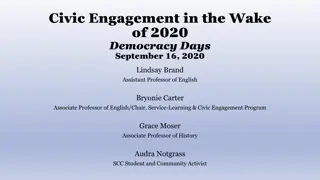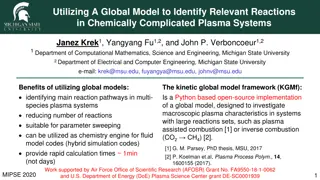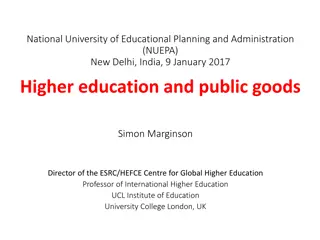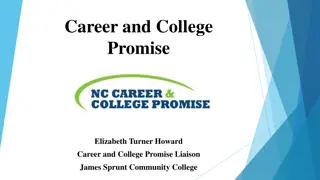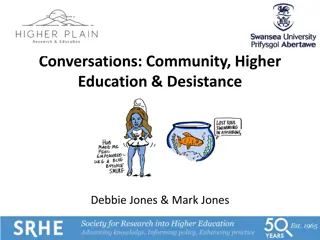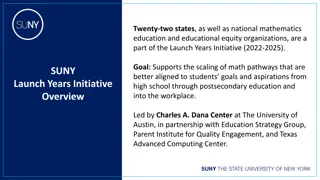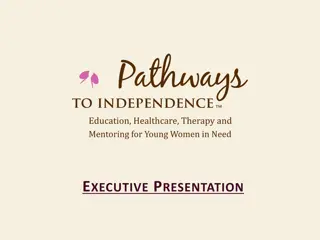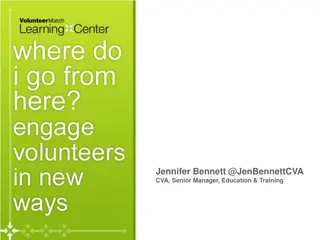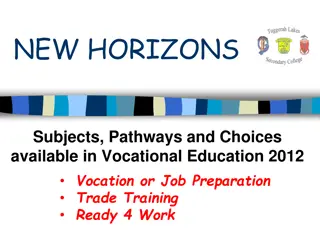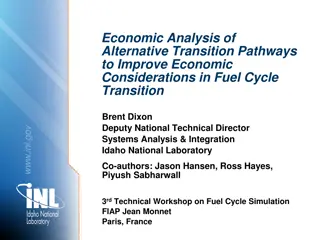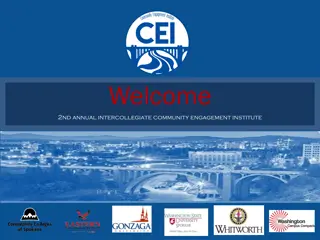Pathways to Community Engagement in Higher Education: A Comprehensive Overview
Exploring the core value of engagement in universities of the 21st century, this content delves into various pathways like institutional, pedagogical, and epistemological that contribute to community interaction and knowledge production.
Download Presentation

Please find below an Image/Link to download the presentation.
The content on the website is provided AS IS for your information and personal use only. It may not be sold, licensed, or shared on other websites without obtaining consent from the author. Download presentation by click this link. If you encounter any issues during the download, it is possible that the publisher has removed the file from their server.
E N D
Presentation Transcript
Bonner April 7, 2020
1991. Scott Nearing: An Intellectual Biography, Philadelphia: Temple University Press. Paperback edition, 1998, Chelsea Green Press.
Engagement as a core value for the university of the 21st century Engagement implies strenuous, thoughtful, argumentative interaction with the non-university world in at least four spheres: setting universities aims, purposes, and priorities; relating teaching and learning to the wider world; the back-and-forth dialogue between researchers and practitioners; and taking on wider responsibilities as neighbours and citizens. Association of Commonwealth Universities
Pathways to the Community Engagement Institutional Pathway The Civic Mission of Higher Education Community Engagement Improved Teaching and Learning Pedagogical Pathway Connecting to the Community Partnership Pathway The New Production of Knowledge Epistemological Pathway
Chapter 7: Emerson's Prophesy John Saltmarsh Action is with the scholar subordinate, but it is essential. Without it he is not yet a man. Without it thought can never ripen into truth The preamble of thought, the transition though which it passes from the unconscious to the conscious, is action. Only so much do I know, as I have lived. Instantly we know whose words are loaded with life, and whose not. Ralph Waldo Emerson, The American Scholar, 1837 I. A Noble Dream and the Scholar's Reality In my training to become a professional historian of American culture, Emerson's 1837 essay, "The American Scholar," was part of the canon. That training, in the late twentieth-century, is governed by a culture of specialized knowledge and techniques for reaching interpretive conclusions by means of rules of evidence and inference. ..
Saltmarsh, J. (2019) Research to Influence Change. IUPUI Series on Service Learning Research, Volume 4. Research on Service Learning: Practical Wisdom for Conducting Research, Edited by Julie A. Hatcher, Robert G. Bringle, and Thomas W. Hahn. Stylus Publishing.
Democratic Engagement (2009), Full Participation (2011), and Next Generation Engagement (2016)
Our work has attempted to do two things: provide a framework of democratic engagement as a way to focus attention on the purposes and processes of engagement practices; and link engagement practice to institutional change, examining the kinds of engagement practices that perpetuate/reinforce the status quo and the kinds of engagement practices that compel change.
Civic Engagement (Focus on Activity and Place) Partnerships and mutuality Deficit-based understanding of community Democratic Civic Engagement (Focus on Purpose and Process) Reciprocity Asset-based understanding of community Community Relationships Academic work done for the public Applied Academic work done with the public Inclusive, collaborative, problem-oriented Knowledge production/research Unidirectional flow of knowledge Positivist/scientific/technocratic Distinction between knowledge producers and knowledge consumers Primacy of academic knowledge Multi-directional flow of knowledge Relational, localized, contextual Co-creation of knowledge Shared authority for knowledge creation Epistemology University as the center of public problem-solving University as a part of an ecosystem of knowledge production addressing public problem-solving Facilitating an inclusive, collaborative, and deliberative democracy Apolitical engagement Political Dimension Knowledge generation and dissemination through community involvement Community change that results from the co- creation of knowledge Outcome
Civic Engagement (Focus on Activity and Place) Democratic Civic Engagement (Focus on Purpose and Process) Applied Inclusive, collaborative, problem- oriented Knowledge production/research Unidirectional flow of knowledge Multi-directional flow of knowledge Positivist/scientific/technocratic Relational, localized, contextual Distinction between knowledge producers and knowledge consumers Co-creation of knowledge Primacy of academic knowledge Shared authority for knowledge creation Epistemology University as the center of public problem-solving University as a part of an ecosystem of knowledge production addressing public problem-solving
First-Order Change Aim is to improve the efficiency and effectiveness of what is done - to make what already exists more efficient and more effective. Second-Order Change Aim is to alter the fundamental ways in which organizations are put together. These changes reflect major dissatisfaction with present arrangements. Does not disturb the basic organizational features, or substantially alter the ways in which faculty and students perform their roles. Those who propose first- order changes believe that the existing goals and structure are both adequate and desirable. Second-order changes introduce new goals, structures, and roles that transform familiar ways of doing things into new ways of solving persistent problems. Does not require changes that alter the culture of the institution, those which require major shifts in an institution s culture the common set of beliefs and values that creates a shared interpretation and understanding of events and actions. Is associated with transformational change, defined as change that (1) alters the culture of the institution by changing select underlying assumptions and institutional behaviors, processes, and products; (2) is deep and pervasive, affecting the whole institution; (3) is intentional; and (4) occurs over time.
Full Participation Full participation is a way of expressing the connections between what is on many of our campuses essential but often disconnected institutional priorities. Full participation is about integrating the priorities of diversity and inclusion public engagement and the success of underserved students said somewhat differently, it is about integrating collaborative ways of generating knowledge active and collaborative teaching and learning and student success
Who are Next Gen Engagement Scholars? A new generation of scholars, educators, and practitioners is committed to the public purposes of higher education, but not committed to perpetuating the existing policies, structures, and practices that have delegitimized their epistemological and ontological position, or what bell hooks describes as their ways of knowing and habits of being.
Generational narrative Generational narrative Parker Palmer in his 1992 essay Divided No More. mid-career faculty (post-tenure) painful realization that the way they practiced their profession was grossly separated from the values that had brought them into their work earlier in their careers (ideals of educating for social justice and the belief in the transformative potential of education) reached a crisis in their lives requiring a deep inner healing, healing was brought about by connecting their professional practice to their deeply held values so they would be divided no more. experienced deep angst and rediscovered these values, and put them into practice through community-based education.
Next Generation narrative Next Gen Scholars do not come to this work post-tenure; they were all shaping their identities as engaged scholars during their graduate studies (if not earlier). They did not enter their faculty careers with a sense of delayed fulfilment or with a resignation built on accommodation to traditional norms only to be able to thrive later in their post-tenure careers. They enter into their faculty careers with an expectation that they would be able to be engaged scholars that they would be able to do engaged scholarly work in all aspects of their faculty role. And they expect that the institution will provide the intellectual space and support to allow them to thrive as engaged scholars. They view themselves as change agents and that one of their roles is to exert agency to change the campus. They will not have to heal the divisions in their inner life because they resist the disciplinary and institutional cultures that fostered such division.
Higher Education Research Institute (HERI) at UCLA Faculty Survey (every 3 years) Community engagement questions were asked for the first time in 2004-2005. 2013-2014, based on the responses of 16,112 full- time undergraduate teaching faculty at 269 four-year colleges or universities. During the past two year, have you collaborated with the local community in teaching/research?
2016-17 HERI Faculty Survey During the past three years, have you: Collaborated with the local community on research/teaching to address their needs? For all faculty: 47.0% At Public Universities: 47.7% Assistant Professor: 47.6% (20,771 FT undergraduate teaching faculty at 143 four-year colleges and universities)
Breakout discussion 1. How do you see the connections between diversity, inclusion, and equity connecting with community engagement, and with student success on your campus? 2. Is there alignment on you campus between the scholarship of the younger, more diverse faculty and the institutional reward system?
Mitchell, T. D. (2008). Traditional vs. critical service-learning: Engaging the literature to differentiate two models. Michigan Journal of Community Service Learning, 14(2). Mitchell, T. D., & Donahue, D. M. (2009). I do more service in this class than I ever do at my site : Paying attention to the reflections of students of color in service-learning: New solutions for sustaining and improving practice. In The future of service-learning: New solutions for sustaining and improving practice (pp. 172-190). Stylus Publishing. Mitchell, Tania D. & Donahue, David M. (2012) Service Learning as a Pedagogy of Whiteness. Equity & Excellence in Education. 45(4), 612-629. Mitchell, Tania D. (2015). Using a Critical Service-Learning Approach to Facilitate Civic Identity Development. Theory Into Practice, 54, 20-28. Mitchell, Tania D. (2017). Teaching Community On and Off Campus: An Intersectional Approach to Community Engagement. New Directions for Student Services, 157, 35-44. Kliewer, B. W. (2013). Why the Civic Engagement Movement Cannot Achieve Democratic and Justice Aims. Michigan Journal of Community Service Learning, 19(2), 72-79. Simpson, J. S. (2014). Longing for justice: Higher education and democracy's agenda. University of Toronto Press. Hernandez, K. (2017). Service learning as a political act in education: Bicultural foundations for a decolonizing pedagogy (Vol. 9). Routledge. Santiago-Ortiz, J. D. (2018). From Critical to Decolonizing Service-Learning: Limits and Possibilities to Social Justice-based Approaches to Community Service Learning. Michigan Journal of Community Service Learning, 25(1).
Service Learning and Critical Service Learning Points of departure: Working to redistribute power Developing authentic relationships Working from a social change perspective Each distinction has both a community and classroom component
Critique of White Paper Jennifer Simpson (2014) Longing for Justice: Higher Education and Democracy s Agenda (Chapter 3) 1. Failure to identify that all scholarship has a political agenda ( the illusion of neutrality ) Does not articulate explicit democratic outcomes tied to values ( refuse to name the material practices and consequences of injustice ) Has not addressed the role of power ( obscures the workings of privilege and power ) Does not tie norms of democratic culture to concrete practices of injustice at the individual and institutional level ( refusal to name injustice ) The suggestion that democratic norms have been beneficent to all in equitable ways represents a dismissal of history and radical denial of current practices ( uncritically accepting democratic norms ) 2. 3. 4. 5.
Neoliberalism, Democracy, Justice and Community Engagement Kliewer critique of the Democratic Engagement White Paper (2009): failed to consider the ways neoliberal ideology and the context of market-based society are stalling the civic engagement field s potential to transform our democracy .a significant oversight. the community engagement movement has failed to account for neoliberalism To maintain robust levels of community engagement in the direction of social justice, the civic engagement filed needs to recognize and challenge the structures of neoliberalism.
reduce inequality and oppression Specify public priorities and democratic outcomes Naming racialized inequality Identify practices and consequences of injustice Attend to historical underpinnings of injustice Focus on Institutions and structures Examine positionality and implication Attend to structural power dynamics Address systemic change that will Student experiences, community cultural wealth, and learning outcomes Faculty identity and scholarship (epistemological values and pedagogical stances Institutional (Campus) practices, structures, policies, and cultures Community Campus SOCIALLY JUST COMMUNITY ENGAGEMENT (Critical Community Engagement)
Countering Neoliberalism through Public Engagement Countering Neoliberalism through Public Engagement The logic of neoliberalism includes relentless attachment to privatization and the destruction of an ethical and relational public, undermining the civic commitments of higher education. As one scholar writes, For critics of the neoliberal model universities became places of civic engagement, with the result that one answer to the abuses of neoliberalism became the engaged university (Jones, E.J., and Shefner, 2014 ). Resist neoliberal logic Affirm a democracy building role of higher education Assert essential connections between education, democracy, and public purposes of higher education
Critical Community Engagement Critical Community Engagement 1. Challenges, confronts, and disrupts misconceptions, untruths, and stereotypes that lead to or exacerbate structural inequality and discrimination. 2. Provides all students and faculty with the resources that they need to reach their full potential. This includes material and emotional resources. 3. Draws on knowledge assets and community cultural wealth of students, faculty, and community partners. This requires having a critical perspective while also rejecting deficit theories. 4. Is about learning and scholarship that promotes critical thinking and supports agency for social change, providing an apprenticeship in one s role in a democratic society.
Epistemic Equity Saltmarsh, J, Afterword: Up Against The Institution, in Cann, C. and Demeulenaere, E. (2020). Activist Academic: Engaged Scholarship for Resistance, Hope and Social Change. Meyers Education Press. A lens of equity foregrounds how epistemology is connected to the identity of the scholar. A lens of epistemic equity could shape efforts to resist systemic forms of oppression and cultivate more equitable faculty reward policy that addresses prejudicial exclusion of scholars from participation in the spread of knowledge through credibility discounting and epistemic marginalization. Equity, in this context, refers to efforts to resist systemic forms of oppression and cultivate a more equitable world one that centers democracy as a primary core value and in which everyone has equal opportunity to thrive regardless of their backgrounds and situations. Thriving is about access to opportunity, networks, resources, and supports based on where we are and where we aspire to be - to reach one s full potential. Regarding scholarship (like community engaged scholarship), enacting epistemic equity would mean examining and responding to the impact higher education systems have on privileging whose knowledge is valued, what research is legitimized, and who gets to participate in the creation and spread of knowledge. This framing of equity draws on Museus, S. D., & LePeau, L. A., Navigating neoliberal organizational cultures: Implications for higher education leaders advancing social justice agendas. In A. Kezar and J. Posselt, Eds. (2019) Administration for social justice and equity in higher education: Critical perspectives for leadership and decision making. New York: Routledge.
Epistemic Equity is Aimed at intentionally coupling diversity and inclusion commitments with organizational structures, policies, and practices. An asset-based approach that values the inclusion of voices that have historically been discounted, delegitimized, and marginalized through academic cultures and practices. Foregrounds identity and power in an analysis of ethics and justice countering systems default processes that silence and delegitimize certain knowers and ways of knowing, creating epistemic exclusion. Strategically shaping institutional cultures, structures, and practices to identify and address prejudicial exclusion of scholars from participation in the spread of knowledge through credibility discounting, and epistemic marginalization. This framing of epistemic equity draws directly on the work of Miranda Fricker, Joan Aker, Victor Ray, and K. Wayne Yang. See Fricker, M. (2007). Epistemic injustice: Power and the ethics of knowing. Oxford University Press; Acker, J. (2006). Inequality regimes: Gender, class, and race in organizations. Gender & society, 20(4), 441-464; Ray, V. (2019). A theory of racialized organizations. American Sociological Review, 84(1), 26-53; and la paperson (K. Wayne Yang) (2017). A third university is possible. University of Minnesota Press.
Breakout discussion 1. Is the community engagement work on your campus representative of critical community engagement what are the indicators? 2. What are some changes you could make so that community engagement practice has a more critical stance?
Elective ElectiveCommunity Community Engagement Classification Engagement Classification
Of the 119 institutions classified in the 2020 cycle, 44 are receiving the classification for the first time while 75 are now re- classified, after being classified originally in 2010 or 2015. These 119 institutions join the 240 institutions that earned the classification during the 2015 selection process, for a total of 359 campuses who are currently active holders of this important designation. Among the 2020 recipients of the classification, 67 are public institutions and 52 are private. For Carnegie s Basic Classification, 52 are classified as research universities, 39 are master s colleges and universities, 22 are baccalaureate colleges, 3 are community colleges, and 3 institutions have a specialized focus arts, medicine, and other health professions. They represent campuses in 37 states and U.S. territories.
University Indianapolis (2015) SCHOOLS IN BONNER NETWORK WITH CARNEGIE CLASSIFICATION 23. The University of the South (2020) 12. Maryville College (2020) 24. Tusculum University (2020) 1. Allegheny College (2015) 13. Montclair State University (2015) 25. University of Nevada, Reno (2020) 2. Averett University (2020) 14. Rhodes College (2015) 26. University of North Carolina at Chapel Hill (2015) 3. Bates College (2015) 15. Rollins College (2015) 4. Berea College (2015) 16. Rutgers University-Camden (2015) 27. University of North Carolina at Charlotte (2015) 5. Berry College (2020) 17. Rutgers University-New Brunswick (2020) 28. University of Richmond (2020) 6. Brown University (2020) 18. Siena College (2015) 29. Virginia Wesleyan University (2020) 7. Capital University (2020) 19. Slippery Rock University (2020) 8. Davidson College (2020) 30. Wagner College (2015) 20. Stetson University (2015) 9. Edgewood College (2015) 31. Warren Wilson College (2015) 21. Stockton University (2020) 10. Emory & Henry College (2015) 32. Widener University (2015) 22. The College of New Jersey (2015) 11. Indiana University-Purdue Key: bold = first time designated
John Saltmarsh John.saltmarsh@umb.edu
